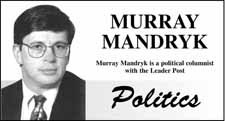By the time you read this, Premier Brad Wall may be preparing to deal with a Liberal-NDP coalition government he doesn't want.
Or, more likely, Wall will be dealing with a Stephen Harper Conservative minority/majority that hasn't always delivered for Saskatchewan.
Of course, Wall and Conservative supporters would beg to differ with the latter observation. In fact, it very much seems the Saskatchewan Party government went out of its way this federal election campaign to downplay the Harper government's failure to deliver ... and perhaps even play up what Harper has delivered.
For example, Wall's government announced last Tuesday the construction of the Boundary Dam Integrated Carbon Capture and Storage Demonstration Project. The $1.24-billion SaskPower infrastructure upgrade "will transform an aging generating unity at Boundary Dam Power station" into a potentially world-first commercial-scale carbon capture facility, the government release boldly stated.
The announcement - six days before the federal vote - also happened to note the $240-million federal investment made three years ago and profusely thanked the federal government for its contribution.
Now, don't get me wrong. There's a lot right with such a massive project that will create 600 jobs while reducing greenhouse gas emissions by a million tonnes a year - the equivalent of taking 250,000 cars off the road.
(Unless, of course, you are of the mind that such massive expenditures would be betters spent on hydroelectric than trying to clean up dirty coal.)
But at the risk of looking a gift horse in the mouth, is this $240 million from the feds really all that much - especially in the context of what Wall has asked for and hasn't gotten from Harper?
One especially wonders about the federal government's generosity to Saskatchewan in the context of Ottawa ignoring previous Wall requests for carbon sequestration, nuclear medical isotopes and money for a domed stadium. And one really wondered about this last fall when Saskatchewan's 13 Conservative MP fell silent on Wall's attempt to block the BHP Billiton takeover of PotashCorp.
It's even more puzzling in the context of Premier Brad Wall saying - after giving up the fight to get Harper to make good on his $800-million-a-year 2006 election province to Saskatchewan to remove non-renewable resources from the equalization formula - in January 2008: "If we are successful, we will have done more than equalization can do."
Well, the Sask. Party government got considerably less than $800-million a year from Ottawa. So one wonders why Wall - after vowing to sit this federal campaign out - suddenly became so vocally supportive of Harper on everything from Liberal policies to the prospects of dealing with a Liberal-NDP coalition government.
After all, doesn't a Saskatchewan Premier have to work with whichever party is in power in Ottawa?
Well, there may be a few reasons why Wall still prefers Harper.
First, Wall and his Sask. Party government are Conservatives at heart. You can't spend your life battling Liberals and New Democrats and not be somewhat biased towards Conservative brethren. If Wall was completely forthright, he would likely admit that he would prefer a Harper government simply because of stronger, interpersonal working relationships.
Second, notwithstanding its failure to give Saskatchewan everything it asked for, it's not has if the Conservatives have completely abandoned Saskatchewan. It has provided agriculture stability programs, flood relief and even a few dollars for things like overpasses in Saskatoon and transportation hubs in Regina. The problem is that the expectations Conservatives created would for this province was sky-high.
Third, it would seem doubtful a Liberal-NDP coalition would be any more generous. After all, didn't the Liberals also oppose changes to equalization? Would they come through for on carbon sequestration, nuclear isotopes or stadium money?
For as disappointing as the Conservatives have been, Wall likely recognizes he has a better chance with his friends and allies in power in Ottawa.
Murray Mandryk has been covering provincial politics for over 15 years.




